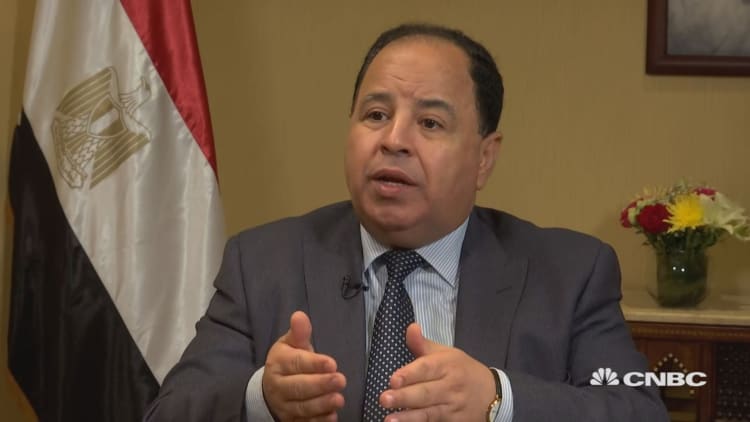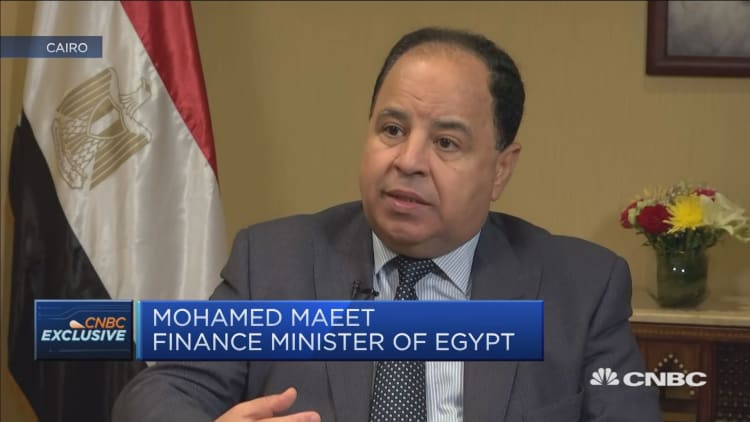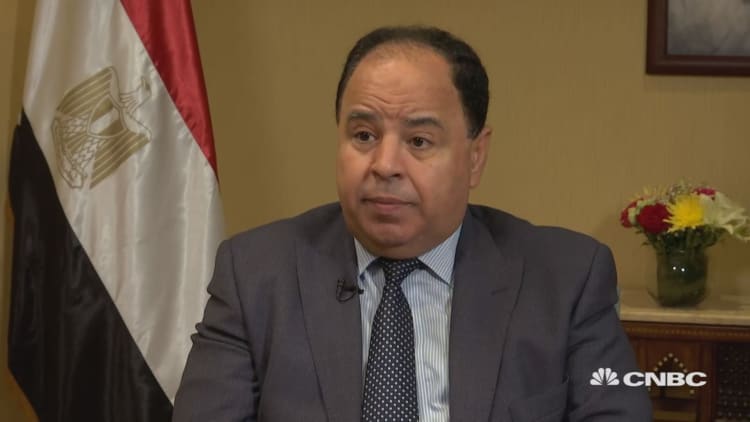
Amid a brewing storm for emerging markets, Egypt's finance minister believes his country's economy can weather what has thrown many others into crisis — as long as the underlying causes don't get any worse.
Speaking to CNBC's Hadley Gamble in Cairo, the recently-appointed Mohamed Maait discussed what the current market turmoil meant for the Middle Eastern country of 90 million.
"It is worrying; however, we are able until now to absorb these negative effects... Egypt's economy has sources to address this. However, I have to be very honest — up to a limit," Maait said. "So hopefully what is happening will be corrected and will move into a stable position, because yes we are absorbing all these shocks — oil prices, emerging market problems, increasing interest rates — but if they continue like that, it will be a problem for us."
Investors have been stepping away from emerging markets on the back of rising global interest rates and a strengthening dollar, which have made the record-high stock of dollar-denominated emerging market debt significantly more painful to pay off. Several major emerging economies, including Turkey, Argentina and Indonesia, are seeing their currencies hit record lows, while even India and China are seeing asset values slip amid growing trade war fears. The MSCI emerging markets index is down nearly 9 percent year-to-date.
Egypt's long road to recovery
Maait's comments come as Egypt enters a period of solid recovery more than seven years after its 2011 revolution and a series of terrorist attacks sent the economy spiraling. But the austerity measures behind some of this growth have led to sharply increased living costs for ordinary Egyptians and deepening social discontent.
Egypt reported its highest economic growth in a decade in July, at 5.3 percent for the 2017-2018 fiscal year compared to 4.2 percent the previous year. The government aims to hit 7 percent growth by 2022, an aspiration bolstered by the International Monetary Fund's (IMF) forecast of 6 percent growth in the near-term — the highest in North Africa — and a reduction in inflation and unemployment of 7 percent by 2022.
The country's lofty macro figures stem from a number of IMF-imposed structural reforms implemented by the Egyptian government since late 2016, alongside a $12 billion loan from the international lender. Egypt floated its currency, began reducing subsidies and raising taxes, and enacted a series of investment reforms — including lowering taxes and facilitating bureaucratic processes for international companies — boosting foreign investor confidence.
The private sector has already reaped benefits, with Egypt's benchmark EGX 30 index up 38.5 percent since December 2016.
Skyrocketing living costs
But what's been less touted is the cost of these austerity measures. Not long after President Abdel Fattah al-Sisi's election in 2014 and the subsequent IMF loan — unlocked after Egypt unpegged its currency, the pound, triggering its 50 percent crash against the dollar — basic costs for Egyptians skyrocketed.
Gas prices have tripled in the past three years and electricity costs have more than quadrupled. Once heavily subsidized by the state, the price of basic staples such as bread, sugar and cooking oil have more than doubled.
And poverty is on the rise — it's currently at nearly 28 percent, up from 25 percent in 2010, and in rural areas is as high as 60 percent, according to the World Bank. Forty percent of Egyptians live on less than $2 a day. Wages have not kept up with the rise in living costs, and the Bank cites high inflation and the erosion of real incomes as having "taken a toll on social and economic conditions."
The finance minister held that these reforms, though exacting, are necessary.
"Our country is going through a very, very difficult situation. We had to make this painful reform, which affected it negatively," Maait said. "However, the outcome of this reform... started to give positive signs."
Indeed, ratings agency Moody's recently upgraded Egypt from stable to positive, ranked as 'B3,' its best since 2011. Unemployment has also come down, and inflation eased to 13.5 percent in July, a major improvement from a record 34.2 percent just one year prior.
Still, most Egyptians have yet to feel the benefits of these improvements on their day-to-day lives. Crime, corruption and pollution, as well as inadequate social services provision, continue to plague the country's surging population.
Debt crisis on the horizon?
Beneath the rosy growth numbers, some economists see a debt crisis in the making.
Egypt's government debt stood at 36.8 percent of gross domestic product (GDP) in June, up 11.6 percent year-on-year and higher than Turkey's figure of 23 percent of GDP. Rising global interest rates and a stronger dollar have pushed up financing costs for Egypt and other emerging markets, just as the country is set to issue a raft of new euro and dollar bonds, worth around $30 million, between 2018 and 2021.
Nonetheless, Maait expressed confidence that the debt load would be reduced.
"We are recognizing that we have a high level of debt and we have to reduce it," he said, adding that the government would introduce policies in the coming weeks designed to reduce the level of debt.

These are to include encouraging further structural reform, establishing internal and external borrowing targets, and continuing to pursue growth, Maait said. "We need our economy to grow, because with our economy growing, creating jobs, creating more revenue, that means our revenue growth is much faster than our expenditure growth which can also help us to reduce the level of borrowing."
Security challenges remain
New sources of revenue, such as recently discovered gas reserves attracting the interest of multinationals like BP, Russia's Rosneft and Italy's ENI, should help in this direction, as will a recent rebound in Egypt's tourism numbers. Devastated by a string of terrorist attacks — most notably the 2015 bomb blast on a Russian airliner departing Egypt's Red Sea resort of Sharm el Sheikh — tourism, a vital source of hard currency and local jobs, is now up 30 percent from last year.
But security remains fragile, as evidenced by an attempted bomb attack on Tuesday outside the U.S. embassy in Cairo. No casualties have been reported.

Western nations have been providing military training and equipment to the Sisi government to aid in its fight against Islamic militants in the restive Sinai peninsula, in what many rights groups describe as prioritizing security while turning a blind eye to the country's poor human rights record.
In the past five years, more than 60,000 people have been arrested or charged by authorities — including numerous peaceful protesters and journalists — and the country has built 19 new prisons to house them, according to Human Rights Watch. General Sisi came to power after the military ousted Muslim Brotherhood candidate Mohamed Morsi in 2013, the country's first-ever democratically elected president.



